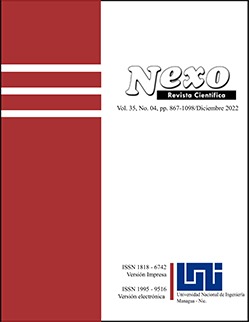Methodology for analysis of factors affecting educational quality, Universidad Nacional de Ingeniería
DOI:
https://doi.org/10.5377/nexo.v35i04.15530Keywords:
Methodology, factors and educational qualityAbstract
The new educational trends imply a change in the role of the university professor who contributes to the improvement of his scientific, investigative and innovative knowledge, applying himself in the teaching and learning process according to the context, assuming an always constant attitude of reflection, criticism and motivation, reflecting in the knowledge acquired and demonstrated in the students. In this sense, a methodology was developed for the analysis of factors that affect educational quality at the National University of Engineering (UNI) in the period from 2008 to 2021, the purpose being; the identification of those actions that promote educational quality at UNI and therefore in the improvement of classroom processes where the teacher is a facilitator, tutor and knowledge manager. In this order of ideas, it can be expressed that within these identified factors, the role of the teacher in classroom processes is paramount and must be focused from mediation and didactic communication, articulated with the scientific domain without ignoring the values that are paramount in student learning training.
Downloads
Downloads
Published
How to Cite
Issue
Section
License
Copyright (c) 2022 Array

This work is licensed under a Creative Commons Attribution 4.0 International License.
The authors who publish in Nexo Scientific Journal agree to the following terms:
- Authors retain the copyright and grant the journal the right of the first publication under the license Creative Commons Attribution License https://creativecommons.org/licenses/by/3.0/, which allows others to share the work with a recognition of the authorship of the work and the initial publication in Nexo Scientific Journal.
- Authors may separately establish additional agreements for the non-exclusive distribution of the version of the work published in the journal (for example, in an institutional repository or a book), with the recognition of the initial publication in Nexo Scientific Journal.
- Authors are allowed and encouraged to disseminate their works electronically (for example, in institutional repositories or in their own website) before and during the submission process, as it can lead to productive exchanges, as well as earlier and greater citation of published works.











